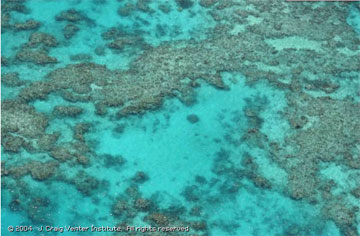Newly discovered ocean genes could help address world problems
Newly discovered ocean genes could help address world problems
mongabay.com
March 13, 2007
An expedition lead by genome pioneer Craig Venter has turned up more than 6 million unknown genes among ocean microbes, some of which could be used to help fight climate change and develop clean sources of energy, according to a study published in PLoS Biology, an open-access journal.
“This publication is not only providing an unprecedented level of new genes and protein family discoveries, but is also pivotal in that we have provided compelling analysis of evolution and function of these genes and proteins within the larger context of organisms interacting with their environment,” said J. Craig Venter, Ph.D., founder and chairman, the J. Craig Venter Institute. “Given the findings, it’s clear that we’ve only begun to scratch the surface of understanding the microbial world around us.”
The team on the Sorcerer II yacht too regular samples which were then broken down and analyzed by scientists at the Venter Institute and the University of California at San Diego.

Picture of the Great Barrier Reef taken during the Sorcerer II expedition. Courtesy of JCVI |
“The analysis we have done so far with this publication shows a tremendous diversity of organisms at the protein level and going forward, I think we will continue to see this tremendous amount of diversity,” said Shibu Yooseph, Ph.D., lead author and computational scientist at JCVI. These data open up a whole new set of research efforts from a computational perspective in designing better tools to be able to deal with this sort of data, as well as making observations on evolution and how functions evolved for these protein families”
Among the findings were proteins that repair DNA damage due to UV light. These could someday be used to help reverse eye damage in humans, while other bacteria discovered on the trip could be the source of new antibiotics said Venter. Carbon dioxide absorbing microorganisms could help scientists develop better mechanisms for capturing carbon from the atmosphere, potentially helping to address global warming.
Citations
- Rusch DB, Halpern AL, Sutton G, Heidelberg KB, Williamson S, et al. (2007) The Sorcerer II Global Ocean Sampling expedition: Northwest Atlantic through eastern tropical Pacific. PLoS Biol 5(3): e77. doi:10.1371/journal.pbio.0050077.
- Citation: Yooseph S, Sutton G, Rusch DB, Halpern AL, Williamson SJ, et al. (2007) The Sorcerer II Global Ocean Sampling expedition: Expanding the universe of protein families. PLoS Biol 5(3): e16. doi:10.1371/journal.pbio.0050016.
- Citation: Kannan N, Taylor SS, Zhai Y, Venter JC, Manning G (2007) Structural and functional diversity of the microbial kinome. PLoS Biol 5(3): e17. doi:10.1371/journal.pbio.0050017.